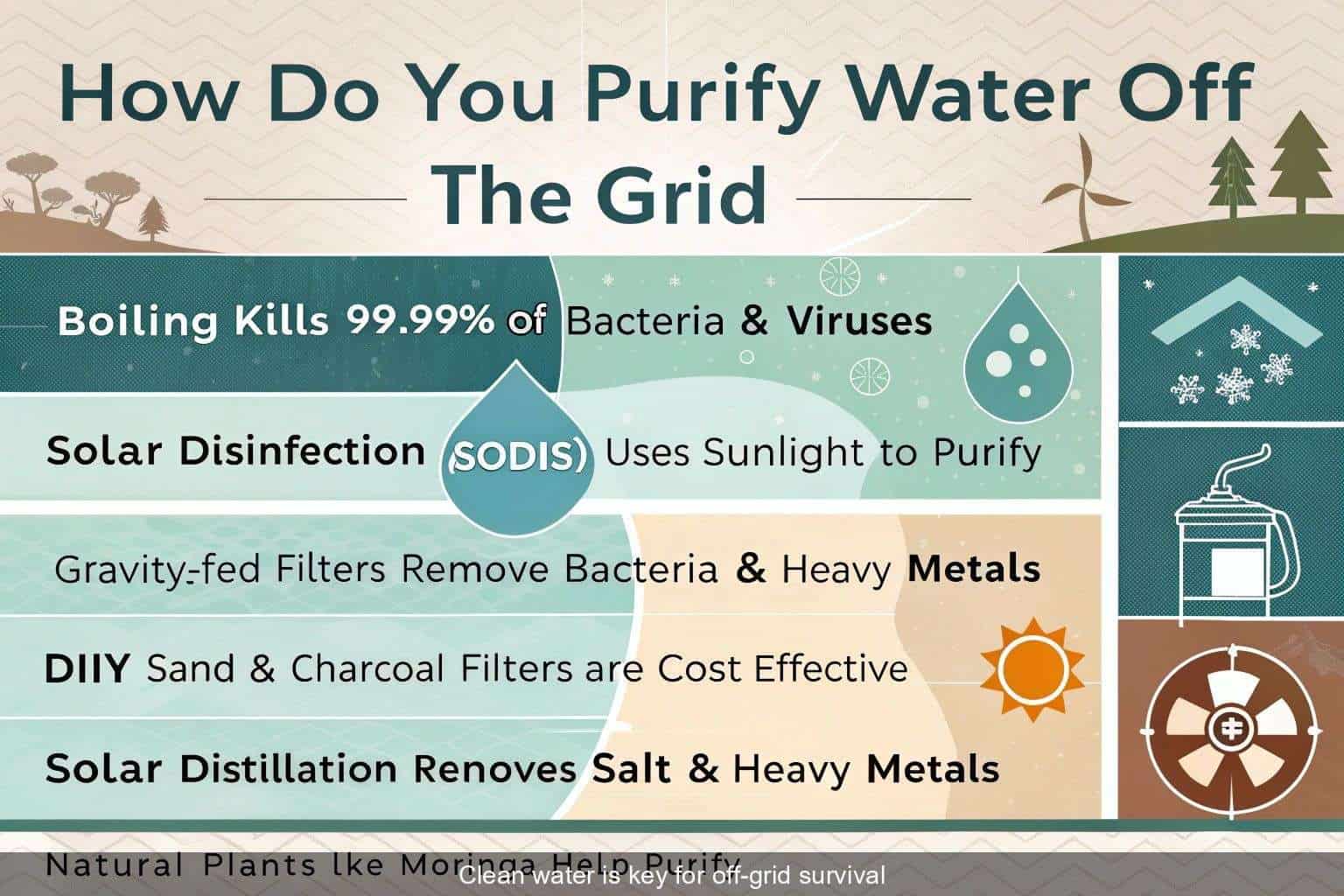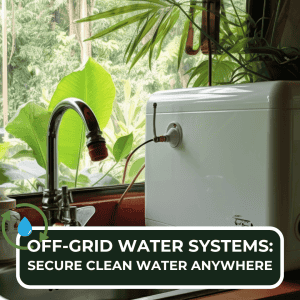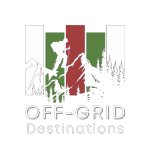Table of Contents
ToggleHow Do You Purify Water Off the Grid? 🌍
Off-grid living demands effective water purification methods that don’t rely on electricity. Residents often turn to wells, rivers, and rain water for their supply. Yet, these sources may contain harmful contaminants. Boiling water is a straightforward option to eliminate bacteria and viruses.
Gravity-fed filters like Berkey are suitable for cabins and RVs, removing bacteria, parasites, and chemicals without needing power. For DIY enthusiasts, constructing a sand and charcoal filter offers a low-cost solution using natural materials for clean drinking water.
Matt and Amy from OffGridDestinations.com emphasize the importance of choosing a purification system that matches one’s lifestyle while weighing cost, efficiency, and environmental sustainability.
Introduction
Securing clean drinking water off the grid can be challenging. A key hurdle is eliminating dangerous contaminants from water without relying on electricity. This blog outlines effective methods for purifying water for safe consumption, far away from any electrical sources.
Expect useful advice ahead.
Health and Safety: This content is for informational purposes. Test water with a certified laboratory before consumption.
Quick Summary: The guide reviews methods including boiling water, Solar Water Disinfection (SODIS), gravity-fed filters, DIY filtration, solar distillation, and plant-based purification.
Key Takeaways
- Boiling water quickly kills almost all bacteria and viruses, offering a cheap, effective way to purify water when off the grid.
- The Solar Water Disinfection (SODIS) method cleans water using sunlight. It needs clear plastic bottles and strong sun for six hours.
- Berkey filters, which work by gravity, can remove bacteria, parasites, and heavy metals without needing power. They’re good for cabins and RVs.
- You can make your own filters with sand and charcoal. These DIY filters are a low-cost option for cleaning water with common materials.
- Using various purification systems guards against different contaminants in natural water from wells, rivers, and rain water.
Why clean water is essential for off-grid living
Off-grid living demands securing your own water supply from wells, rain water, and rivers. These sources often carry germs, metals, and dirt that can cause serious illnesses if consumed untreated.
Ensuring access to clean water is crucial for health in remote locations far from medical facilities.
To purify drinking or cooking water without city utilities, individuals turn to various methods like filters. Matt and Amy from OffGridDestinations.com use a gravity-fed filter system in their Costa Rican home to guarantee safe drinking water all year long.
This approach demonstrates that maintaining a clean water supply off the grid is achievable with proper equipment.
Overview of purification methods
Living off the grid demands clean drinking water to maintain health. Boiling water kills 99.99% of germs quickly. Solar disinfection, or SODIS, uses sunlight for six hours to purify water.
Gravity-fed filters like Berkey eliminate nearly all bacteria and heavy metals.
DIY methods also offer solutions for purifying water using natural or household materials. Creating a sand and charcoal filter removes impurities effectively, while solar distillation can extract arsenic, fluoride, and salt from water sources.
Certain plants serve as eco-friendly filters, cleaning rain water or stream water from wells or lakes without harming the environment. It is important to always ensure that the water used is tested regularly for safety.
Natural Water Sources & Contaminants
Off-grid living demands sourcing water from wells, rivers, and collected rain. These natural sources are essential for daily life but carry risks of contamination. Wells can harbor microorganisms, sediment, and heavy metals due to soil leaching.
Rivers may be polluted by upstream chemical discharges and waste products.
To make this water safe for consumption and use, off-grid dwellers must understand potential contaminants to choose effective purification strategies. By identifying threats in their water sources, they can apply specific treatments to remove impurities and ensure drinkable quality.
Common Off-Grid Water Sources (Wells, Rivers, Rainwater)
Living off the grid, people use wells, rivers, and rain water for their needs. Wells tap into ground water, typically cleaner but can have heavy metals or chemicals from nearby farms. 2 Rivers offer surface water but often carry waste and pollutants.
Key Off-Grid Water Sources:
– Wells provide groundwater.
– Rivers supply surface water.
– Rain water comes from collected precipitation.
Main Contaminants Include:
– Pesticides and runoffs add chemical substances.
– Lead and arsenic represent heavy metals found in some sources.
– Bacteria and protozoa are common biological organisms in these waters.
Filtering these sources is essential to ensure safe drinking water in off-grid living situations.
Typical Contaminants Found in Untreated Water
Untreated water carries health risks from contaminants like bacteria, viruses, parasites, and chemicals. Bacteria can lead to stomach issues and diarrhea. Viruses, smaller than bacteria, require effective filtration or purification for removal.
Parasites may infect the liver and intestines.
Industrial runoff and agricultural activities pollute water with chemicals that alter taste and cause long-term health effects if consumed often. Contaminants often have heavy metals which pose dangers in even small amounts.
Non-Electric Water Purification Methods
Living off the grid requires effective water purification methods. Boiling water is a straightforward technique. It eliminates bacteria and viruses by heating water to a rapid boil for at least one minute. 1 Solar water disinfection, or SODIS, uses sunlight to purify water.
It depends on strong sunlight and takes time.
Gravity-fed filters like Berkey are another option that doesn’t use electricity. These systems use carbon filters to clean the water as it moves through them due to gravity alone. While they offer effective filtration, their initial cost is higher compared to other methods.
These non-electric solutions play an essential role in ensuring safe drinking water in remote locations or during power interruptions, catering to various needs within off-grid living scenarios.
Boiling Water (Basic & Emergency Purification)

- Boil water by heating it in a clean container to avoid adding contaminants.
- Maintain a rolling boil for at least one minute, extending to three minutes at higher elevations.
- Allow the boiled water to cool before use to prevent burns.
- To improve taste, oxygenate the water by transferring it between two containers.
- Boiled water suits drinking, cooking, and hygiene needs in off-grid scenarios.
- A fire or stove serves as needed heat sources but may be hard to come by without dry wood or fuel.
- Boiling doesn’t remove chemicals or heavy metals; ensure these aren’t in your water first.
Matt and Amy advocate for multiple purification methods when living off-grid. Despite its limitations with chemicals and metals, boiling remains an effective way to combat disease-causing pathogens.
Solar Water Disinfection (SODIS)
Solar Water Disinfection, or SODIS, is a simple and cost-effective way to purify water. This method uses sunlight and clear plastic bottles. To purify the water, fill these bottles and expose them to direct sunlight for at least six hours.
The effectiveness of SODIS depends on using clear bottles and clean water. Cloudy water reduces its efficiency because the sun’s rays cannot penetrate well.
Gravity-Fed Water Filters (Berkey, Sawyer, AquaRain)

Berkey filters can get rid of 99.999% of bacteria and heavy metals. This makes the water safe to drink. People in remote areas rely on these filters for access to clean drinking water.
DIY Water Filtration Methods
To make a water filter at home, start with two buckets, gravel, sand, activated carbon, and a clean cloth. Drill holes in one bucket’s bottom. Place gravel first, then sand, followed by activated carbon.
Cover it all with the cloth. Pour unfiltered water through this setup to get filtered water.
For removing heavy metals and salt from water, try solar distillation. Use a clear plastic bottle or glass container filled with dirty water placed under sunlight for several hours.
The sun evaporates contaminated liquid leaving clean condensed water on the sides of the container.
Matt and Amy from OffGridDestinations.com have built these filters using local materials. They highlight that these simple techniques provide safe drinking water without needing electricity or complex devices.
How to Build a Sand & Charcoal Filter (Step-by-Step)
Creating a sand and charcoal water filter is simple and effective. Here’s how:
- Start with a clean five-gallon bucket.
- Drill small holes in the bottom for water to flow out.
- Cover holes with a cloth or coffee filters to prevent sand and charcoal from escaping.
- Add a two-inch layer of gravel for even water distribution.
- Add a thick layer of sand on top of gravel to catch smaller particles.
- Spread activated carbon or charcoal over the sand to remove odors and improve taste by trapping contaminants.
- Place another layer of gravel on top to stabilize the structure.
- Pour water into the filter, allowing it to move through each layer, getting purified.
- Collect the filtered water in clean containers for drinking or cooking.
- Regularly test the filter with new water sources and replace sand, charcoal, and gravel as necessary.
This method provides a reliable way to filter your water for those living off-grid, using materials from nature responsibly.
Solar Distillation for Removing Heavy Metals & Salt
Solar distillation removes heavy metals and salt using the sun’s energy. This method suits off-grid locations because it requires minimal resources:
- Sunlight and basic equipment are all that’s needed for solar distillation, making it perfect for remote areas.
- It effectively gets rid of heavy metals and salt, tackling issues in drought-hit regions as noted by the EPA.
- Building a solar still involves clear plastic or glass, a collection container for distilled water, and a basin for untreated water.
- Using black surfaces to absorb heat boosts the process’s efficiency.
- Research into salt-tolerant algae could enhance solar desalination techniques in the future.
- Emerging microdevices may improve off-grid water desalination efficiency in secluded settings.
- The approach is eco-friendly, cutting down on energy use and backing alternative water sources recommended by environmental agencies.
- Distilled water reuse contributes to waste reduction and provides a steady supply during dry spells.
At OffGridDestinations.com, we’ve tested various methods. Solar distillation excels due to its simplicity and ability to produce drinkable water without relying on electricity.
Using Natural Plants for Filtration
Plants effectively filter water, especially in off-grid areas. People use these natural filters to purify their water far from city infrastructures. Some plants, like cattails, remove heavy metals and pollutants from water with their roots and leaves.
Likewise, the Moringa oleifera tree uses its seeds to clean water. The seeds clump dirt particles together to settle at the bottom. This method provides clear water without needing electricity or costly devices. Plant-based purification is eco-friendly and secures safe drinking water off the grid.
Best Off-Grid Water Purification Systems (2025 Guide)
Off-grid travelers and eco-conscious adventurers need reliable water purification systems. The Berkey gravity filter excels in removing 99.999% of bacteria and heavy metals from sources such as wells, rivers, and rain water catchments.
The Sawyer Point ZeroTWO portable filter offers ease of use and effectiveness in remote locations where water quality is uncertain. It provides dependable purification for those exploring off the beaten path.
For homes away from city infrastructure, the EcoWater 3700 stands out as a superior whole-house system. It ensures clean water from every tap by treating well water, rain water, and other sources comprehensively.
These recommendations come from individuals who have adopted off-grid living, proving their practicality in real-life situations.
Best Gravity Filter (Berkey)
The Berkey water filter excels for off-grid adventurers, removing 99.999% of bacteria and heavy metals for safe drinking water. It operates without electricity, using gravity to push water through its cleaning elements—ideal for remote locations.
Many users report the Berkey filter effectively removes contaminants and safeguards against bacteria and viruses efficiently. Its design suits various environments, from small cabins to larger homes, offering a high flow rate and significant volume capacity.
Best Portable Filter (Sawyer Point ZeroTWO)
The Sawyer Point ZeroTWO portable water purification system is ideal for off-grid living or travel. It efficiently removes contaminants, making it safe to drink from various water sources.
Field tests in Costa Rica have confirmed its effectiveness. This compact design fits well in backpacks, RVs, and cabins. Users can purify rain water, river water, and groundwater with it.
The Sawyer Point ZeroTWO provides clean drinking water without needing electricity or complex setups.
Best Whole-House System (EcoWater 3700)
Switching from portable filters like Sawyer Point ZeroTWO, off-grid adventurers need a stronger system for their homes. The EcoWater 3700 offers a top solution for whole-house water filtration.
It ensures clean, safe water flows through every faucet for drinking, cooking, and bathing.
This system is efficient at removing contaminants such as heavy metals and chlorine. With its high flow rate, it maintains strong water pressure even in busy households. For those living far from city water supplies, the EcoWater 3700 provides large-scale purified water access.
It has proven to exceed quality and reliability expectations, making it essential for sustainable living practices in remote areas.
Choosing the Right Water Purification Method
Choosing the right water purification system depends on where you live and your water source. For off-grid travelers, portable options like Sawyer Point ZeroTWO provide clean drinking water on the move.
Those in cabins or homesteads may prefer a Berkey gravity filter for a more fixed solution. These filters are good for off-grid living because they don’t need electricity.
The decision also hinges on cost, efficiency, and sustainability. A solar distillation unit can eliminate heavy metals and salt but requires time and sunshine to work. Boiling water quickly kills bacteria and viruses within minutes.
At OffGridDestinations.com, we evaluate various systems against contaminants common in ground water, rain water, and surface waters such as rivers or lakes. Our guides aim to help you find the most suitable system for your needs while ensuring that the water remains safe.
Below is a comparative table highlighting the benefits and drawbacks of each method:
| Method | Benefits | Drawbacks |
|---|---|---|
| Boiling water | Eliminates 99.99% of bacteria & viruses in 1-3 minutes | Does not remove heavy metals or chemicals |
| SODIS | Cost-effective; uses sunlight | Requires 6+ hours; less effective in cloudy conditions |
| Gravity-fed filters | Removes 99.999% of bacteria & heavy metals | Higher initial cost |
| DIY Filtration | Low cost; uses natural materials | May need frequent maintenance and testing |
| Solar Distillation | Removes heavy metals, salt, arsenic, and fluoride | Time-consuming; needs sufficient solar energy |
Matching Methods to Your Off-Grid Setup (Cabins, RVs, Homesteads)
Cabins in the mountains or woods use Berkey gravity-fed water filters. These systems work without electricity and can process a lot of water from rivers or rain water. They remove over 99.999% of bacteria, ideal for places where you don’t worry about weight.
RVs and homesteads get good use from portable filters like Sawyer Point ZeroTWO. This system is easy to carry and connects to water lines or containers for quick clean water access on the move.
Homesteaders using well water or rain water can benefit from an EcoWater 3700 whole-house system. It cleans every drop of water in their homes, removing heavy metals and microorganisms.
Cost, Efficiency & Sustainability Considerations
For those setting up off-grid homes, cabins, or RVs, considering cost, efficiency, and sustainability is key to maintaining a clean water supply affordably.
Aging infrastructure often leads to high costs and water loss. Off-grid living avoids this issue through smart choices. Renewable energy-powered methods lower expenses and reduce dependence on external power sources.
For example, solar distillation units purify water using sunlight without needing electricity. 3 Gravity-fed filters also offer an energy-saving way to access clean drinking water by minimizing physical effort.
These practices align with best management practices (BMPs), emphasizing efficiency, renewable use, and conservation.
Conclusion & Final Tips
Purifying water off-grid is essential, considering cost, efficiency, and sustainability. Various methods meet different needs – from boiling to solar disinfection and advanced filtration systems like Berkey or Sawyer filters.
To ensure safety:.
– Explore several purification strategies.
– Choose a high-quality system that fits your environment.
– Maintain your equipment to keep water clean.
For those in remote areas or seeking eco-friendly solutions, learning these techniques ensures a secure, sustainable water supply. Our top filter picks offer the best results.
Why Having Multiple Filtration Methods is Crucial
Applying multiple water purification techniques is essential for remote living to guarantee a constant flow of pure drinking water. Various methods effectively eradicate different contaminants.
For instance, gravity-fed water filters handle bacteria and parasites, while solar distillation deals with heavy metals and salt. This diversity ensures individuals always have an option to sanitize their source water.
At OffGridDestinations.com, accumulated experience has shown the significance of having adaptable options for fluctuating water conditions. People using these methods know the value of combining UV treatment with sediment filters to ensure that the water remains safe.
Maintaining different systems provides a reliable backup during unforeseen challenges.
How to Store & Preserve Water in Off-Grid Locations
Off-grid adventurers need to store and filter their water carefully. Dark, food-grade tanks or barrels work well for keeping rain water or groundwater. These containers block sunlight, stopping algae from growing.
For daily use, people choose jerry cans or heavy-duty bottles and add bleach to kill bacteria. This step is essential for those living away from city water supplies.
FAQs: Common Questions About Off-Grid Water Purification
People looking to ensure safe drinking water in off-grid locations have various purification options.
Drinking untreated rain water poses risks due to potential contaminants. For those considering the best off-grid water filtration system, gravity-fed filters like Berkey are efficient at removing bacteria and heavy metals without relying on electricity.
These systems provide a reliable way to access clean drinking water while living off the grid.
What is the cheapest way to purify water off-grid?
Boiling water offers a low-cost solution for purifying it off the grid. It eliminates bacteria and viruses in 1-3 minutes. You just need a heat source like a campfire or stove, plus a pot.
This method works well during remote adventures with limited resources.
Solar Water Disinfection (SODIS) also provides an affordable way to clean water using sunlight. Fill clear plastic bottles with dirty water and place them under direct sun for six hours or more.
How can I purify water without a filter?
To purify water off-grid, one can boil it. This kills most bacteria and viruses within one to three minutes but doesn’t remove heavy metals or salt. Solar water disinfection, or SODIS, uses the sun’s UV rays over at least six hours to make clear water safe to drink by killing pathogens.
It may fail with chemical pollutants or in cloudy conditions compared to standard filters.
Distilling is another option that removes tough contaminants such as arsenic, fluoride, and salt from ocean water. By using simple items like pots and plastic sheets, anyone can set up a DIY distiller.
This method works with rain water and groundwater too. These approaches ensure the safety of drinking water during long stays away from conventional facilities without needing electronic filters.
Can you drink rain water without treatment?
Drinking rain water can be safe if it comes from a clean system and the air quality is good. Still, experts usually recommend treating it first because rain water can pick up harmful substances.
These include bacteria, viruses, heavy metals, and chemicals that could harm your health.
Boiling water kills 99.99% of pathogens, making it safer to drink. Solar water disinfection (SODIS) also works well by using sunlight for six hours to kill microorganisms. Filters like Berkey or Sawyer Point ZeroTWO remove over 99.999% of dangerous elements in rain water.
For concerns about heavy metals or salt, solar distillation removes these entirely.
Now let us look at the best off-grid water filters available today.
What is the best off-grid water filter?
The Berkey Gravity Water Filter is a top pick for off-grid adventurers needing clean drinking water. It uses black filters to clean water from sources like wells and rivers, removing heavy metals, protozoa, and bacteria without needing electricity.
Its easy setup makes it ideal for cabins and RVs.
The Sawyer Point ZeroTWO Portable Water Filtration system suits personal use well. It connects easily to water bottles or hydration packs inline. This system can filter out 99.9997% of harmful elements down to 0.02 microns, ensuring safe drinking even from unclear sources.
Both systems are sustainable, with durable filters that efficiently purify your drinking supply.
FAQs
1. What is the process to purify water off the grid?
To purify water off the grid, you can use a variety of methods such as distilling water, using a ceramic filter or UV filter, implementing a reverse osmosis system, or adding a chlorine solution. Each method has its own level of filtration and is designed to operate even during power outages.
2. How does a sand filter work in an off-grid water system?
In an off-grid water system, a sand filter works by forcing ground or rain water through layers of sand that trap silt and other impurities. The clean water runs into holding tanks for home use.
3. Can I use ultraviolet light for my off-grid water treatment?
Yes! Ultraviolet light is used in some types of water purifiers suitable for use in remote locations without access to tap water resources. It kills protozoan and other harmful organisms ensuring that your drinking water is safe.
4. Are there any specific filters recommended for whole house purification systems?
For whole house systems, it’s advisable to consider options like activated carbon filters or 5 micron filters which offer comprehensive filtration including heavy metal (elements) removal from your tap water or well waters.
5. Is distilled rain water safe enough for consumption after treatment with Katadyn Combi?
Absolutely! The Katadyn Combi combines both active charcoal and ceramic filtration to treat collected rain water effectively making it palatable even when you’re living far away from city amenities.
6. What precautions should be taken while using countertop filters during power outages?
Countertop filters are great alternatives during power outages; if javascript is disabled, please enable javascript in your browser before proceeding so that devices can monitor these systems’ backwash cycles regularly and keep them functioning optimally even without electricity.
Disclaimer: This content is for informational purposes only and does not substitute professional advice. Affiliate Disclosure: Some links in this article may be affiliate links, which can generate commissions at no additional cost to you.
Background: Matt & Amy from OffGridDestinations.com share real-world case studies and have tested water filter systems in remote locations like Costa Rica.
References
https://homesteading.rusticskills.com/water-filters/off-grid-water-filtration-purification/ (2019-03-15)
https://todayshomeowner.com/lawn-garden/guides/complete-guide-to-off-grid-water-systems/ (2025-03-11)
https://www.susprep.com/off-grid-water/how-to-purify-water-on-your-homestead/
https://www.epa.gov/water-research/determining-prevalence-contaminants-treated-and-untreated-drinking-water
https://www.epa.gov/ground-water-and-drinking-water/emergency-disinfection-drinking-water
https://pmc.ncbi.nlm.nih.gov/articles/PMC8201346/
https://www.usaberkeyfilters.com/off-grid-water-system/
https://www.h2odistributors.com/info/how-to-make-a-water-filter/
https://melscience.com/US-en/articles/makeshift-water-filter-experiment/
https://diysolarforum.com/threads/offgrid-drinking-water-filtration.13274/
https://pubmed.ncbi.nlm.nih.gov/39821874/
https://bbgardens.org/native-plants-water-filtration-abilities/
http://www.thatyurt.com/good-stuff/best-off-grid-water-filters/
https://www.usaberkeyfilters.com/off-grid-water-system/
https://www.sawyer.com/category/water-filtration
https://theprepared.com/blog/review-sawyer-point-zerotwo-bucket-system/
https://ecowatercc.com/our-products/ecr-3700/
https://www.usaberkeyfilters.com/blog/2024/06/guide-to-off-grid-water-filtration-for-remote-living/ (2024-06-24)
https://if-water.com/blogs/news/how-to-choose-an-off-grid-water-purifier
https://theberkey.com/blogs/water-filter/best-off-grid-water-filtration-how-to-filter-your-water-without-the-power-grid
https://theberkey.com/blogs/water-filter/best-off-grid-water-filtration-how-to-filter-your-water-without-the-power-grid
https://www.newater.com/how-to-treat-rainwater-for-drinking/











